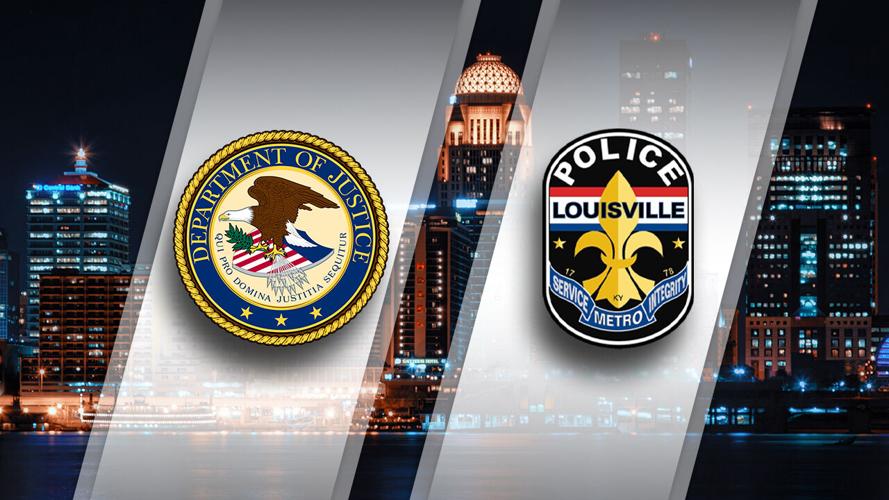LOUISVILLE, Ky. (WDRB) – While President Donald Trump's Justice Department has said it may halt police reform agreements negotiated by former President Joe Biden's administration, Louisville Police Chief Paul Humphrey said police were “fully committed” to the agreement between the city and U.S. Department of Justice.
Wednesday, media reports said the new Trump administration “may wish to reconsider” any settlements or consent decrees — court-enforceable agreements to reform police agencies — that were finalized by the Biden administration within the last 90 days.
This raises the prospect that it may abandon two consent decrees finalized in the final weeks of the Biden administration in Louisville and Minneapolis, Minnesota.
In an interview Thursday with WDRB News, Humphrey said the city has negotiated an agreement with the Department of Justice and “regardless of whether it’s under a consent decree or oversight of federal government … is going to be striving toward constant improvement.”
It is unclear if U.S. District Court Judge Benjamin Beaton will still sign the consent decree, which would ensure federal oversight and monitoring of the agreement between police and the DOJ.
Last week, Beaton repeatedly questioned whether the court should be involved in overseeing the agreement between the city and DOJ that lays out sweeping reforms of Louisville police.
Beaton, who was nominated by Trump, expressed concern that, if he approves the consent decree, a judge would be responsible for "day to day operations" of the police force instead of city officials.
Beaton asked if there was a "less intrusive" remedy of reforming the police department without court oversight and monitoring.
"Normally, judges aren't involved in running police departments day to day," he said.
Beaton asked why the agreement reached in December wouldn't be enough, saying both sides could petition the court if there are problems.
On Thursday, Humphrey said the department was planning to do a “vast majority” of the reforms regardless of the agreement.
But, he said, if the consent agreement is not officially approved by a judge, there is a lot of administrative reporting typically required to report to the DOJ that would no longer be necessary.
“If they are not part of it, there’s no reason to do those things,” he said.
Attorneys for the DOJ have argued that the approval from Beaton and subsequent independent monitoring were essential to enforce the changes as LMPD has promised reforms before, but either not followed through or didn't go far enough.
Asked about this on Thursday, Humphrey said if he doesn’t meet the commitments of change expected by the mayor and community, he will likely not remain chief.
“I’m here to make sure we do this the right way,” he said.
If Beaton signs the consent decree, he could go against Trump’s desire to halt the reforms. But he has asked both sides to get together and answer certain questions before he makes any decision.
And Beaton has indicated the consent decree would cost millions of dollars and he wasn't sure federal court involvement was warranted in this instance, especially when LMPD has already made several of the recommended changes and agreed to continue with further reforms.
"I understand that, for the DOJ, this is the way to go," he said last week. "But the fact that it has happened before (in other cities) doesn't mean it should happen here."
The 248-page DOJ report was the result of months of negotiations that began after the Justice Department concluded in 2023 that Louisville police and Metro government for years engaged in practices that violated the U.S. Constitution and federal law, including excessive use of force and searches based on invalid warrants.
The parties negotiated for nine months before agreeing to the consent decree in December.
With a court-ordered consent decree, the city or LMPD could be held in contempt if they refuse or fail to intact reforms outlined in the FOP report. It would also fund an independent monitor who would oversee the police department's progress and report to the court.
The agreement between the DOJ and LMPD was the result of an investigation accusing the department of illegal and unconstitutional practices.
In the hearing last week, Beaton also questioned the timing of the consent decree agreement reached in December, just before Trump takes office again.
"I'm really concerned racing to rubber stamp a (248-page) consent decree," he said. "We're really in a difficult position now."
During Trump's first term, Attorney General Jeff Sessions raised concerns about consent decrees in a 2018 policy memo, including their impacts on budgets and local control.
Both Louisville and DOJ officials said the timing of the consent decree agreement had nothing to do with the changing presidential administration but simply reflected the time it took for the lengthy investigation and negotiations to be completed.
Mayor Craig Greenberg's administration previously said it expects the consent decree will be approved by a federal judge, starting a process city officials hope will be completed in less than five years. An independent monitor who reports to the court will oversee the police department's progress.
The city plans to name the monitor— typically a team of experts in policing, law and other specialties — by the spring. It has agreed to pay no more than $1.475 million annually for an initial two-year term. After five years, a U.S. District Court judge would hold a hearing on Louisville's progress.
Under the agreement, the department would revise its use-of-force and training policies, improve search warrant practices, ensure traffic stops are conducted legally, ensure the fair investigations of police misconduct and address sexual harassment allegations in the department, among other reforms.
The agreement addresses 13 specific areas, from traffic stops to officer assistance, and requires police to show "substantial compliance" with the promised changes before each section is satisfied.
The Biden administration's Justice Department announced the findings of its review March 8, 2023. That came nearly two years after the 2020 police killing of Breonna Taylor, which prompted both local and national criticism of the police department as well as months of protests.
U.S. Attorney General Merrick Garland listed myriad examples of Louisville police misconduct and crimes, such as throwing drinks at pedestrians, racial disparities in arrests and traffic stops, assaulting citizens with disabilities and calling Black people "monkeys, animal and boy."
The federal investigation into LMPD cites 63 different incidents of alleged misconduct, according to an appendix of the 90-page report the DOJ released following their roughly two-year investigation.
The Justice Department investigation began about a year after Taylor was killed during a botched police raid.
Related Stories:
- Trump's new Justice Department leadership orders a freeze on civil rights cases, including Louisville
- Federal judge questions need for court oversight of Louisville police reform deal
- Louisville police reforms will be studied for 2 years by Ohio State University researchers
- Louisville and the DOJ agreed to a consent decree. Here's what it means and what comes next.
- Louisville, US Justice Department agree to deal requiring sweeping reforms of LMPD
Copyright 2025 WDRB Media. All Rights Reserved.














